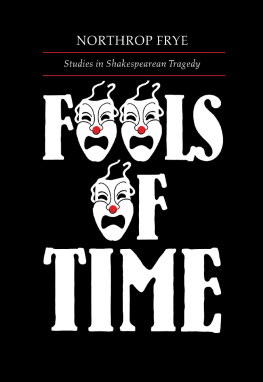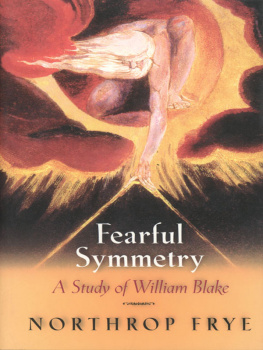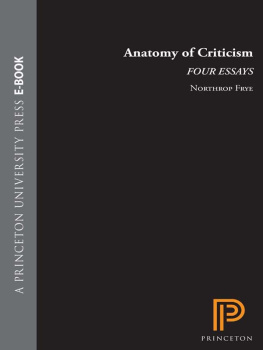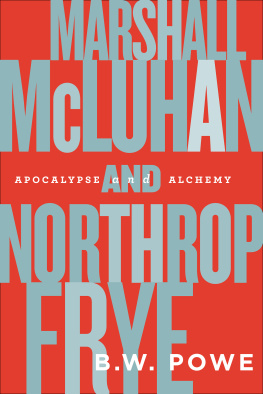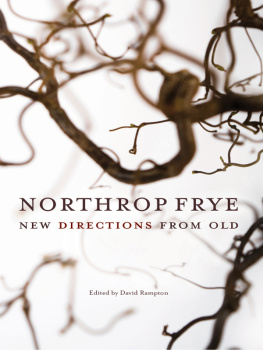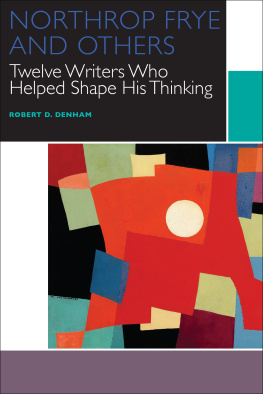Northrop Frye - Fools of Time
Here you can read online Northrop Frye - Fools of Time full text of the book (entire story) in english for free. Download pdf and epub, get meaning, cover and reviews about this ebook. year: 2016, publisher: University of Toronto Press, genre: Science. Description of the work, (preface) as well as reviews are available. Best literature library LitArk.com created for fans of good reading and offers a wide selection of genres:
Romance novel
Science fiction
Adventure
Detective
Science
History
Home and family
Prose
Art
Politics
Computer
Non-fiction
Religion
Business
Children
Humor
Choose a favorite category and find really read worthwhile books. Enjoy immersion in the world of imagination, feel the emotions of the characters or learn something new for yourself, make an fascinating discovery.
- Book:Fools of Time
- Author:
- Publisher:University of Toronto Press
- Genre:
- Year:2016
- Rating:3 / 5
- Favourites:Add to favourites
- Your mark:
- 60
- 1
- 2
- 3
- 4
- 5
Fools of Time: summary, description and annotation
We offer to read an annotation, description, summary or preface (depends on what the author of the book "Fools of Time" wrote himself). If you haven't found the necessary information about the book — write in the comments, we will try to find it.
Fools of Time will be welcomed not only by many scholars who are familiar with Dr. Fryes keen critical insight but also by undergraduates, graduates, high-school and university teachers who have long valued his work as a means toward a firmer grasp and deeper understanding of English literature.
Fools of Time — read online for free the complete book (whole text) full work
Below is the text of the book, divided by pages. System saving the place of the last page read, allows you to conveniently read the book "Fools of Time" online for free, without having to search again every time where you left off. Put a bookmark, and you can go to the page where you finished reading at any time.
Font size:
Interval:
Bookmark:
FOOLS OF TIME
The Alexander Lectureship was founded in honour of Professor W. J. Alexander, who held the Chair of English at University College, University of Toronto, from 1889 to 1926. Each year the Lectureship brings to the University a distinguished scholar or critic to give a course of lectures on a subject related to English Literature.
NORTHROP FRYE
| FOOLS OF TIME |
|
Studies in Shakespearean Tragedy
University of Toronto Press
University of Toronto Press 1967
Toronto Buffalo London
Reprinted in paperback
1973, 1977, 1981, 1985, 1991, 1996, 2011, 2013, 2016
ISBN 0-8020-1671-5 (cloth)
ISBN 0-8020-6215-6 (paper)
LC 67-5748
Canadian Cataloguing in Publication Data
Frye, Northrop, 19121991
Fools of time
(The Alexander lectures; 1966-67)
ISBN 0-8020-6215-6 (pbk.)
1. Shakespeare, William, 15641616 Tragedies.
I. Title. II. Series.
PR2983.F7 822.33 C67-2653
DESIGNED BY ELLEN HUTCHISON
 What follows is the original written version of the Alexander Lectures, delivered at Convocation Hall, University of Toronto, on March 15, 16, and 17, 1966. The oral version, considerably shorter and more concise, had its advantages, but for publication I felt that the longer form, with its greater number of examples and expanding passages, was preferable. This is the fifth series of lectures I have published, and two more series are in course of publication. But for all the experience I have had with it, I still find the public lecture a fantastically difficult genre, and nowhere more so than in a field so thoroughly worked over as Shakespearean tragedy. I can only hope that the constant effort to make the familiar statement into a fresh insight has here and there been successful.
What follows is the original written version of the Alexander Lectures, delivered at Convocation Hall, University of Toronto, on March 15, 16, and 17, 1966. The oral version, considerably shorter and more concise, had its advantages, but for publication I felt that the longer form, with its greater number of examples and expanding passages, was preferable. This is the fifth series of lectures I have published, and two more series are in course of publication. But for all the experience I have had with it, I still find the public lecture a fantastically difficult genre, and nowhere more so than in a field so thoroughly worked over as Shakespearean tragedy. I can only hope that the constant effort to make the familiar statement into a fresh insight has here and there been successful.
I am greatly indebted to the Canada Council for a Fellowship that helped me to work on this and other projects.
The following preface was read at the beginning of the first lecture:
The invitation to deliver the Alexander Lectures came to me in England, when I had already contracted for two other series. Yet I accepted very promptly, and for two reasons. In the first place, I was deeply touched by the great and most unusual honour of being asked to contribute to this famous series on my own campus.
In the second place, the invitation came at almost the same moment as the news of the death of Professor A. S. P. Woodhouse. If it is not too pretentious to do so, I should like to dedicate these lectures to Professor Woodhouses memory. Although I met him once or twice, I never really knew Professor Alexander, who retired from teaching in the year that I entered high school, but I did know of Professor Woodhouses admiration for him, and it is mainly through Professor Woodhouse that I can attach myself personally to the teacher commemorated in this series.
I have only to add that the occasion of giving the lectures at the invitation of University College was made both pleasant and memorable by the kindness and hospitality of Professor Clifford Leech and Principal Douglas LePan of that College, and President Claude Bissell. The fact that all three are old friends did not diminish the sense of gracious welcome.
NORTHROP FRYE
Victoria College in the
University of Toronto
1967
My father as he slept:
The tragedy of order
The tailors of the earth:
The tragedy of passion
Little world of man:
The tragedy of isolation
he slept:
The tragedy
of order
 The basis of the tragic vision is being in time, the sense of the one-directional quality of life, where everything happens once and for all, where every act brings unavoidable and fateful consequences, and where all experience vanishes, not simply into the past, but into nothingness, annihilation. In the tragic vision death is, not an incident in life, not even the inevitable end of life, but the essential event that gives shape and form to life. Death is what defines the individual, and marks him off from the continuity of life that flows indefinitely between the past and the future. It gives to the individual life a parabola shape, rising from birth to maturity and sinking again, and this parabola movement of rise and fall is also the typical shape of tragedy. The mood of tragedy preserves our ambiguous and paradoxical feeling about death; it is inevitable and always happens, and yet, when it does happen, it carries with it some sense of the unnatural and premature. The naivet of Marlowes Tamburlaine, astonished by the fact that he should die when he has been wading through other mens blood for years, is an example, and even Shakespeares Caesar, so thoroughly disciplined in his views of death in general, still finds his actual death a surprise.
The basis of the tragic vision is being in time, the sense of the one-directional quality of life, where everything happens once and for all, where every act brings unavoidable and fateful consequences, and where all experience vanishes, not simply into the past, but into nothingness, annihilation. In the tragic vision death is, not an incident in life, not even the inevitable end of life, but the essential event that gives shape and form to life. Death is what defines the individual, and marks him off from the continuity of life that flows indefinitely between the past and the future. It gives to the individual life a parabola shape, rising from birth to maturity and sinking again, and this parabola movement of rise and fall is also the typical shape of tragedy. The mood of tragedy preserves our ambiguous and paradoxical feeling about death; it is inevitable and always happens, and yet, when it does happen, it carries with it some sense of the unnatural and premature. The naivet of Marlowes Tamburlaine, astonished by the fact that he should die when he has been wading through other mens blood for years, is an example, and even Shakespeares Caesar, so thoroughly disciplined in his views of death in general, still finds his actual death a surprise.
Being in time is not the whole of the tragic vision: it is, in itself, the ironic vision. Because it is the basis of the tragic vision, the ironic and the tragic are often confused or identified. The nineteenth-century pessimism which produced the philosophy of Schopenhauer and the novels of Thomas Hardy seems to me ironic rather than tragic. So does the philosophy and literature of existentialism, which I think of, for reasons that may become clearer later on, as post-tragic. But tragedy, no less than irony, is existential: the conceptions that existential thinkers have tried to struggle with, care, dread, nausea, absurdity, authenticity, and the like, are all relevant to the theory of tragedy. Tragedy is also existential in a broader, and perhaps contradictory, sense, in that the experience of the tragic cannot be moralized or contained within any conceptual world-view. A tragic hero is a tragic hero whether he is a good or a bad man; a tragic action is a tragic action whether it seems to us admirable or villainous, inevitable or arbitrary. And while a religious or philosophical system that answers all questions and solves all problems may find a place for tragedy, and so make it a part of a larger and less tragic whole, it can never absorb the kind of experience that tragedy represents. That remains outside of all approaches to being through thought rather than existence. The remark of the dying Hotspur, Thoughts the slave of life, comes out of the heart of the tragic vision.
Tragedy revolves around the primary contract of man and nature, the contract fulfilled by mans death, death being, as we say, the debt he owes to nature. What makes tragedy tragic, and not simply ironic, is the presence in it of a counter-movement of being that we call the heroic, a capacity for action or passion, for doing or suffering, which is above ordinary human experience. This heroic energy, glorified by itself as something invincible which bursts the boundaries of normal experience, is the basis of romance. In tragedy the heroic is within the human context, and so is still limited and finite, formed and shaped by death. In Greek tragedy especially, we can see how death is both the punishment of the aggressor and the reward of his victim. This makes tragic sense, if not moral sense. But because the heroic is above the normal limits of experience, it also suggests something infinite imprisoned in the finite. This something infinite may be morally either good or bad, for the worst of men may still be a hero if he is big enough to anger or frighten the gods. Man may be infinite if he is infinite only in his evil desires. The hero is an individual, but being so great an individual he seems constantly on the point of being swept into titanic forces he cannot control. The fact that an infinite energy is driving towards death in tragedy means that the impetus of tragedy is
Next pageFont size:
Interval:
Bookmark:
Similar books «Fools of Time»
Look at similar books to Fools of Time. We have selected literature similar in name and meaning in the hope of providing readers with more options to find new, interesting, not yet read works.
Discussion, reviews of the book Fools of Time and just readers' own opinions. Leave your comments, write what you think about the work, its meaning or the main characters. Specify what exactly you liked and what you didn't like, and why you think so.

